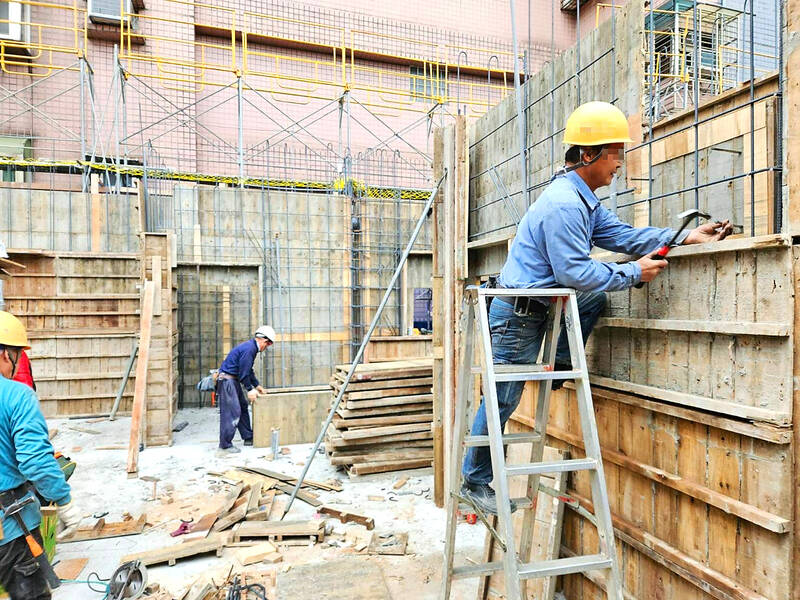Using hand-held or power tools that disturb the peace in noise-restricted areas in Taipei City would be banned at certain times, the Taipei City Government’s Department of Environmental Protection said on Friday.
The amendment, effective immediately, states that construction workers or interior decorators would no longer be allowed to use hand-held or power tools that would create noise and disturb the peace in residences and high-rise buildings in noise-restricted areas from 10pm to 8am the following day and from noon to 2pm on weekdays, and from 6pm to 8am the next day on weekends.
Contravening the ordinance could result in a fine of NT$3,000 to NT$30,000 (US$93.97 to US$939.67) per report, it said.

Photo courtesy of the Taipei City Government’s Department of Environmental Protection
City regulations have also divided the city into four noise restriction categories: the first is absolute quiet, the second is reserved for residential areas, the third is for residential, commercial and industrial areas, and the fourth is for industrial or traffic-related areas.
The previous version of the ordinance only stated that construction workers could not use hand-held or power tools at the aforementioned times in category 1 to 3 areas and forbade the use of hand-held or power tools for interior renovation at the aforementioned times across all categories.
The department said the ban was in response to the 7,424 complaints Taipei City residents filed about noise produced by hand-held or power tools, which accounted for 35.3 percent of noise pollution complaints in the city.
Noise generated by interior renovation accounted for 80 percent of complaints about hand-held or power tools, the department added.
The ordinance was amended given the overwhelming complaints from Taipei residents, Air and Noise Pollution Prevention Division Chiu Tian-an (邱天安) said, adding that they hope to restrict noise pollution and guarantee peace and quiet.
He urged people to report any contraventions by calling the 1999 hotline.

Taiwan has received more than US$70 million in royalties as of the end of last year from developing the F-16V jet as countries worldwide purchase or upgrade to this popular model, government and military officials said on Saturday. Taiwan funded the development of the F-16V jet and ended up the sole investor as other countries withdrew from the program. Now the F-16V is increasingly popular and countries must pay Taiwan a percentage in royalties when they purchase new F-16V aircraft or upgrade older F-16 models. The next five years are expected to be the peak for these royalties, with Taiwan potentially earning

STAY IN YOUR LANE: As the US and Israel attack Iran, the ministry has warned China not to overstep by including Taiwanese citizens in its evacuation orders The Ministry of Foreign Affairs (MOFA) yesterday rebuked a statement by China’s embassy in Israel that it would evacuate Taiwanese holders of Chinese travel documents from Israel amid the latter’s escalating conflict with Iran. Tensions have risen across the Middle East in the wake of US and Israeli airstrikes on Iran beginning Saturday. China subsequently issued an evacuation notice for its citizens. In a news release, the Chinese embassy in Israel said holders of “Taiwan compatriot permits (台胞證)” issued to Taiwanese nationals by Chinese authorities for travel to China — could register for evacuation to Egypt. In Taipei, the ministry yesterday said Taiwan

Taiwan is awaiting official notification from the US regarding the status of the Agreement on Reciprocal Trade (ART) after the US Supreme Court ruled US President Donald Trump's global tariffs unconstitutional. Speaking to reporters before a legislative hearing today, Premier Cho Jung-tai (卓榮泰) said that Taiwan's negotiation team remains focused on ensuring that the bilateral trade deal remains intact despite the legal challenge to Trump's tariff policy. "The US has pledged to notify its trade partners once the subsequent administrative and legal processes are finalized, and that certainly includes Taiwan," Cho said when asked about opposition parties’ doubts that the ART was

If China chose to invade Taiwan tomorrow, it would only have to sever three undersea fiber-optic cable clusters to cause a data blackout, Jason Hsu (許毓仁), a senior fellow at the Hudson Institute and former Chinese Nationalist Party (KMT) legislator, told a US security panel yesterday. In a Taiwan contingency, cable disruption would be one of the earliest preinvasion actions and the signal that escalation had begun, he said, adding that Taiwan’s current cable repair capabilities are insufficient. The US-China Economic and Security Review Commission (USCC) yesterday held a hearing on US-China Competition Under the Sea, with Hsu speaking on